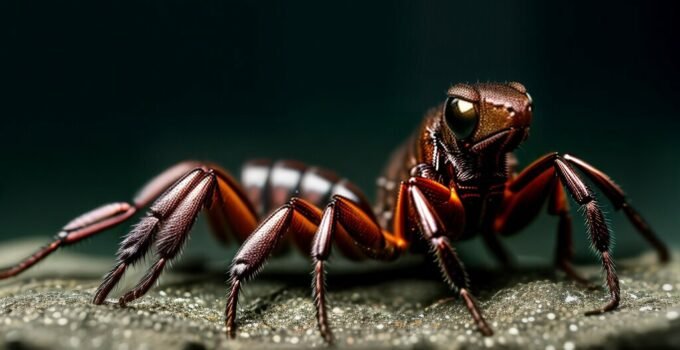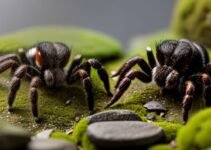Keeping a pet scorpion can be a unique and rewarding experience, but it’s crucial to practice safe handling techniques to ensure the well-being of both owner and pet. This expert guide will provide valuable insights into understanding scorpion behavior, creating a safe environment, proper handling techniques, feeding and watering practices, and maintaining the health and wellness of pet scorpions. Below you will find safe handling practices for keeping pet scorpions.
Key Takeaways:
Proper care guidelines are essential for responsible pet scorpion ownership.
Creating a suitable habitat is crucial for the overall health and well-being of pet scorpions.
Safe handling techniques are necessary for both the owner and scorpion’s safety.
Feeding, watering, and maintaining the health of pet scorpions require careful attention and detail.
Understanding Pet Scorpion Behavior
Proper care for pet scorpions requires a good understanding of their behavior. While scorpions may seem intimidating, they are generally docile animals that only sting when threatened.
Body Language
Observing your pet scorpion’s body language can provide useful information about its temperament. A relaxed scorpion will have its tail down and its pinchers resting against its body. A stressed or threatened scorpion will arch its body and elevate its tail in a defensive posture.
Aggression Triggers
Pet scorpions can become aggressive if they feel threatened or stressed. Loud noises, sudden movements, and unnecessary handling can all trigger defensive behavior. To prevent aggression, it is important to handle pet scorpions with care and avoid stressing them.
Stress Reduction Techniques
Reducing stress in pet scorpions can help promote healthy behavior. Providing hiding spots, avoiding excessive handling, and maintaining a consistent lighting schedule can all help reduce stress in your pet scorpion.
Creating a Safe Environment for Your Pet Scorpion
Providing a safe and suitable habitat for pet scorpions is essential for their well-being. Here are some key points to consider:
| Aspect | Guidelines |
|---|---|
| Enclosure Size | Scorpions require sufficient space to move around and burrow. The enclosure size should be at least three times the length of the scorpion. |
| Enclosure Type | Aquariums and plastic containers with secure lids are suitable as enclosures. Ensure that the enclosure is well-ventilated and escape-proof. |
| Temperature and Humidity | Scorpions require a temperature range of 75 to 85 degrees Fahrenheit and a humidity level of 60 to 80 percent. Monitor the temperature and humidity with a thermometer and hygrometer. |
| Substrate | Provide a substrate that allows for burrowing and moisture retention, such as coconut fiber or vermiculite. Avoid using sand or gravel which can cause impaction. |
| Lighting | Scorpions do not require UVB lighting but do benefit from a natural day and night cycle. Provide a low-wattage nocturnal bulb or use a red or blue light to simulate moonlight. |
By following these guidelines, you can create a safe and comfortable environment for your pet scorpion.
Proper Handling Techniques for Pet Scorpions
Handling a pet scorpion requires a careful and cautious approach. Here are some step-by-step instructions to help you safely handle your scorpion:
- Before handling your scorpion, make sure you have a clear and unobstructed area to work in. Remove any potential hazards or escape routes.
- Use a pair of long-handled forceps or tweezers to gently nudge your scorpion onto your open palm or onto a flat surface.
- Always keep your hand flat and avoid any sudden movements. Scorpions are sensitive to vibrations and can become easily startled.
- If your scorpion has to be moved quickly or is particularly agitated, use a clear plastic container or glass jar to catch and transport it.
- If you need to pick up your scorpion, use a soft-bristled paintbrush or a piece of cardboard to gently coax it onto your hand or into the container.
- Handle your scorpion only as long as necessary and avoid excessive touching or petting. Scorpions are not social animals and can become easily stressed or agitated.
Pet Scorpion Handling Precautions
Here are some additional precautions to keep in mind when handling your pet scorpion:
- Never handle your scorpion if you are feeling ill or unsteady. If you have any medical conditions that may affect your ability to handle your scorpion safely, seek assistance from someone else.
- Always wear protective gloves and clothing when handling your scorpion, especially if you have an allergy or hypersensitivity to insect stings or venom.
- If you are handling a venomous scorpion species, exercise extra caution and seek expert advice before attempting to handle it.
- Never attempt to handle a scorpion with your bare hands, as this can result in serious injury or even death.
Feeding and Watering Your Pet Scorpion
Feeding and watering your pet scorpion is an important aspect of responsible ownership. It is crucial to meet their nutritional and hydration needs to ensure their health and well-being. Here are some guidelines to follow:
Feeding Your Pet Scorpion
Scorpions are carnivorous and require a diet of live prey. Some suitable prey items include crickets, mealworms, and roaches. It is important to provide prey that is appropriately sized for your scorpion. A good rule of thumb is to offer prey no larger than the width of your scorpion’s body.
Feeding schedules vary depending on the species and size of your scorpion. Some can be fed once a week, while others require more frequent feedings. It is best to research the specific needs of your scorpion and adjust their feeding schedule accordingly.
Portion sizes should also be considered. Overfeeding can lead to obesity and health issues, while underfeeding can cause malnutrition. It is recommended to offer prey in small portions and monitor your scorpion’s weight to ensure they are maintaining a healthy size.
Watering Your Pet Scorpion
Providing fresh water is essential to keep your pet scorpion hydrated. A shallow dish of water should be placed in their enclosure and changed regularly to prevent bacterial growth. Some scorpion species prefer to drink water droplets from surfaces instead, so it is important to observe their behaviors and adjust accordingly.
It is also important to maintain proper humidity levels in the enclosure. Scorpions require a certain level of humidity to facilitate hydration and molting. Some suitable substrates for maintaining humidity include coconut fiber and sphagnum moss.
Overall, feeding and watering your pet scorpion requires attention to detail and adherence to their specific needs. By following these guidelines, you can ensure a healthy and happy life for your scorpion.
Health and Wellness of Pet Scorpions
Maintaining the health and wellness of pet scorpions is essential for their overall well-being. It is important to provide them with suitable living conditions and monitor their behavior and physical condition regularly. Here are some tips for keeping your pet scorpion healthy and happy:
- Regular veterinary check-ups: It is crucial to schedule regular check-ups with a veterinarian who specializes in exotic animals. They will be able to identify and treat any potential health issues early on.
- Recognizing signs of illness or injury: Keeping an eye on your pet scorpion’s behavior and physical condition can help you identify any signs of illness or injury. Some common symptoms include lethargy, loss of appetite, difficulty moving, and discoloration.
- Preventive measures: To maintain their health, it is important to take preventive measures against common scorpion health issues such as dehydration, mites, and infections. This includes maintaining proper temperature and humidity levels, providing a clean and suitable living environment, and monitoring their diet and hydration levels closely.
By following these tips, you can help ensure the health and well-being of your pet scorpion and enjoy the rewarding experience of responsible pet ownership.
Interacting with Your Pet Scorpion
Interacting with a pet scorpion can be a rewarding experience, but it’s important to do so safely and responsibly. Scorpions are not domesticated animals and may become stressed or aggressive if handled improperly.
When interacting with your pet scorpion, it’s important to maintain a safe distance and avoid unnecessary stress. Scorpions rely heavily on their sense of touch and vibrations to detect potential threats, so sudden movements or loud noises may cause them to become defensive.
Providing enrichment opportunities, such as hiding places or climbing structures, can help stimulate your scorpion’s natural behaviors and provide mental stimulation.
Handling Venomous Scorpion Species
Handling venomous scorpion species requires specialized knowledge and equipment. These scorpions should only be handled by experts who have extensive experience and training. It is crucial to take extra precautions to avoid any potential risks and ensure the safety of both the handler and the scorpion.
Specialized Equipment
When handling venomous scorpions, using specialized equipment is crucial. This includes tools such as forceps, tongs, and gloves that provide extra protection against stings. It is also important to have a venom extraction kit on hand in case of an emergency.
Expert Knowledge
Expert knowledge is essential when handling venomous scorpion species. It is crucial to be familiar with the specific species and their behavior, as well as their venom toxicity and potential reactions to the venom. Handlers should also be educated on the proper techniques for immobilizing and removing venomous scorpions.
Caution
When dealing with venomous scorpions, it is important to exercise extreme caution. Handlers should wear protective gear at all times and avoid provoking or agitating the scorpion. It is also important to have a plan in place for what to do in case of a sting, and to seek immediate medical attention if necessary.
Section 9: Educating Others About Scorpion Safety
Becoming a responsible pet scorpion owner entails educating yourself about safe handling practices to ensure the well-being of your pet. However, it is also essential to share your knowledge and experience with others to promote responsible scorpion ownership in the community.
One of the most effective ways to educate others about scorpion safety is by sharing your own experiences and knowledge. You can start by discussing the proper care guidelines for scorpions with friends, family, and acquaintances who may be interested in owning a scorpion. This can include information on proper enclosure size and type, temperature and humidity requirements, as well as safe handling techniques.
You can also share your knowledge online through blogs, forums, and social media. By helping others learn from your experience, you can prevent potential health risks to both humans and scorpions.
Furthermore, it’s important to raise awareness about the potential dangers of scorpion ownership and the proper precautions that should be taken. For instance, pet scorpions should be kept out of reach of children and other pets, and handling should only be done by adults who have experience and knowledge of safe handling techniques.
Overall, educating others about scorpion safety is an essential component of responsible pet ownership. By sharing your knowledge and promoting responsible practices, you can help ensure the safety and well-being of both humans and scorpions in the community.
Conclusion
Keeping pet scorpions can be a rewarding experience, but it requires responsible ownership and safe handling practices. By following proper care guidelines, pet owners can ensure the well-being of both themselves and their scorpions.
Understanding the behavior of pet scorpions, creating a safe environment, practicing proper handling techniques, and providing suitable food and water are all essential aspects of responsible ownership. Additionally, regular veterinary check-ups and recognizing signs of illness or injury can help maintain the health and wellness of scorpions.
Sharing Knowledge
As responsible pet scorpion owners, it’s important to share knowledge and raise awareness about potential risks. By educating others about scorpion safety, we can promote responsible ownership in the community and prevent unnecessary accidents.
Expert Assistance
Handling venomous scorpion species requires expert knowledge and specialized equipment. Anyone considering keeping these types of scorpions as pets should seek guidance from experienced professionals and exercise caution when dealing with potentially dangerous animals.
In conclusion, safe handling practices are critical for keeping pet scorpions. By following the guidelines outlined in this article, pet owners can promote the well-being of their scorpions and enjoy a rewarding ownership experience.
FAQ
Q: What are the safe handling practices for keeping pet scorpions?
A: Safe handling practices for keeping pet scorpions include ensuring a suitable habitat, proper feeding and watering, understanding their behavior, and using caution when handling venomous species.
Q: How can I understand pet scorpion behavior?
A: To understand pet scorpion behavior, it is important to observe their body language, learn about their aggression triggers, and implement stress reduction techniques.
Q: What should I consider when creating a safe environment for my pet scorpion?
A: When creating a safe environment for your pet scorpion, factors to consider include the size and type of enclosure, temperature and humidity requirements, substrate choices, and proper lighting.
Q: What are the proper handling techniques for pet scorpions?
A: Proper handling techniques for pet scorpions involve correct hand placement, using tools or gloves when necessary, and maintaining a calm and confident demeanor during the process.
Q: How should I feed and water my pet scorpion?
A: Feeding and watering your pet scorpion involves offering suitable prey items, following feeding schedules, providing appropriate portion sizes, and ensuring a constant supply of fresh water.
Q: How can I maintain the health and wellness of my pet scorpion?
A: To maintain the health and wellness of your pet scorpion, regular veterinary check-ups, recognizing signs of illness or injury, and taking preventive measures against common health issues are crucial.
Q: How should I interact with my pet scorpion?
A: Interacting with your pet scorpion should involve observing from a safe distance, avoiding unnecessary stress, and providing enrichment opportunities to promote their well-being.
Q: What should I know about handling venomous scorpion species?
A: When handling venomous scorpion species, it is important to have expert knowledge, use specialized equipment, and exercise extreme caution due to the potential danger involved.
Q: How can I educate others about scorpion safety?
A: As a responsible pet scorpion owner, you can educate others about scorpion safety by sharing knowledge, raising awareness about potential risks, and promoting responsible ownership in the community.



